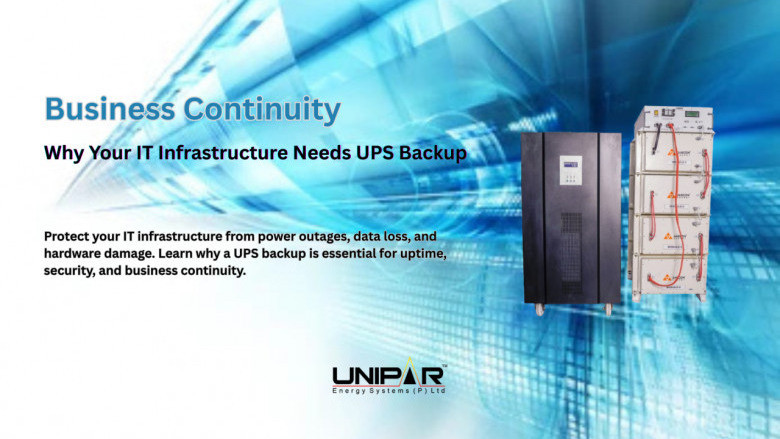views
Visit Our Website: www.unipar.in
Contact Us: +91 9035024760 / uniparenergy@gmail.com

In today’s always-connected world, even a few seconds of downtime can cost your business more than just money — it can damage your reputation, interrupt services, and compromise data integrity. A UPS backup system that acts as an uninterruptible power source is a critical part of maintaining business continuity and protecting your IT infrastructure.
Also Read: Online UPS vs. Offline UPS: Which One Do You Need?
What Is a UPS Backup System?
A UPS backup system is a device that provides emergency power to your equipment when the main power source fails. Unlike generators, which take time to start up, a UPS supplies instant battery power, bridging the gap between a power outage and a secondary energy source (or the restoration of utility power).
Why Power Interruptions Are a Major Threat to Business Operations
Power outages, brownouts, voltage spikes, and surges can cause:
- Server crashes
- Data corruption or loss
- Damaged hardware
- Downtime for critical applications and services
- Lost revenue and productivity
For companies that rely on servers, networks, data canters, and cloud-based systems, power back up for their computers is a must, else, these disruptions can be catastrophic.
Also Read: Boost Your Solar System Performance with an MPPT Solar PCU
How UPS Backup Supports Business Continuity
A properly configured UPS system as your back up power source with proper battery back up batteries can help you:
1. Prevent Data Loss
When power is lost suddenly, open files or active processes on servers and computers may become corrupted. A UPS allows devices to stay online long enough for automated or manual shutdown procedures, reducing the risk of data corruption.
2. Maintain Network Availability
UPS systems can keep network switches, routers, and modems running, ensuring that communication and internet access are not instantly cut off during a blackout — a must for businesses with remote teams or cloud-based tools.
3. Protect Expensive Hardware
Power fluctuations can damage internal components of your IT equipment. UPS units help regulate voltage and provide clean, stable power, extending the life of your devices.
4. Ensure Compliance and Uptime SLAs
Many industries have strict compliance regulations for data protection and uptime. UPS as a backup power supply helps companies meet these obligations by minimizing unplanned outages.
5. Buy Time for Backup Generators to Kick In
For facilities with backup generators, a UPS acts as the first line of defense, providing power instantly until the generator takes over — a critical feature for data centers and hospitals.
What Type of UPS Is Right for Your Business?
There are three main types of UPS systems:
- Standby UPS – Basic protection for desktops and peripherals and also for power back up for Wi-Fi router
- Line-Interactive UPS – Ideal for small-to-medium businesses; offers voltage regulation and backup.
- Online UPS – Best for critical infrastructure; provides continuous, clean power without any transfer time. These may come with a Wi-Fi for remote monitoring of power back up
You may also opt for a solar battery back up system. Each business’s needs differ depending on the scale of operations, hardware sensitivity, and uptime requirements.
Also Read: Off-Grid Solar Power: Cleanest and Greenest Energy for You
Who Needs a UPS Backup System?
UPS systems aren’t just for enterprise-level IT. They're critical for:
- Small and medium-sized businesses (SMBs)
- Retail stores with POS systems
- Healthcare providers and medical equipment
- Call centers and customer service hubs
- Financial institutions and trading platforms
If your organization depends on digital tools, data access, or internet connectivity, a UPS is not optional — it's essential.
Also Read: Solar UPS: The Intelligent Solution for Powering Your Home or Business
Final Thoughts: Don’t Wait for a Disaster
The question isn’t if a power disruption will happen — it’s when. Investing in a UPS power backup solution for your power back up ensures your business remains operational, compliant, and secure during outages. It’s a small investment for significant peace of mind and long-term business continuity.










